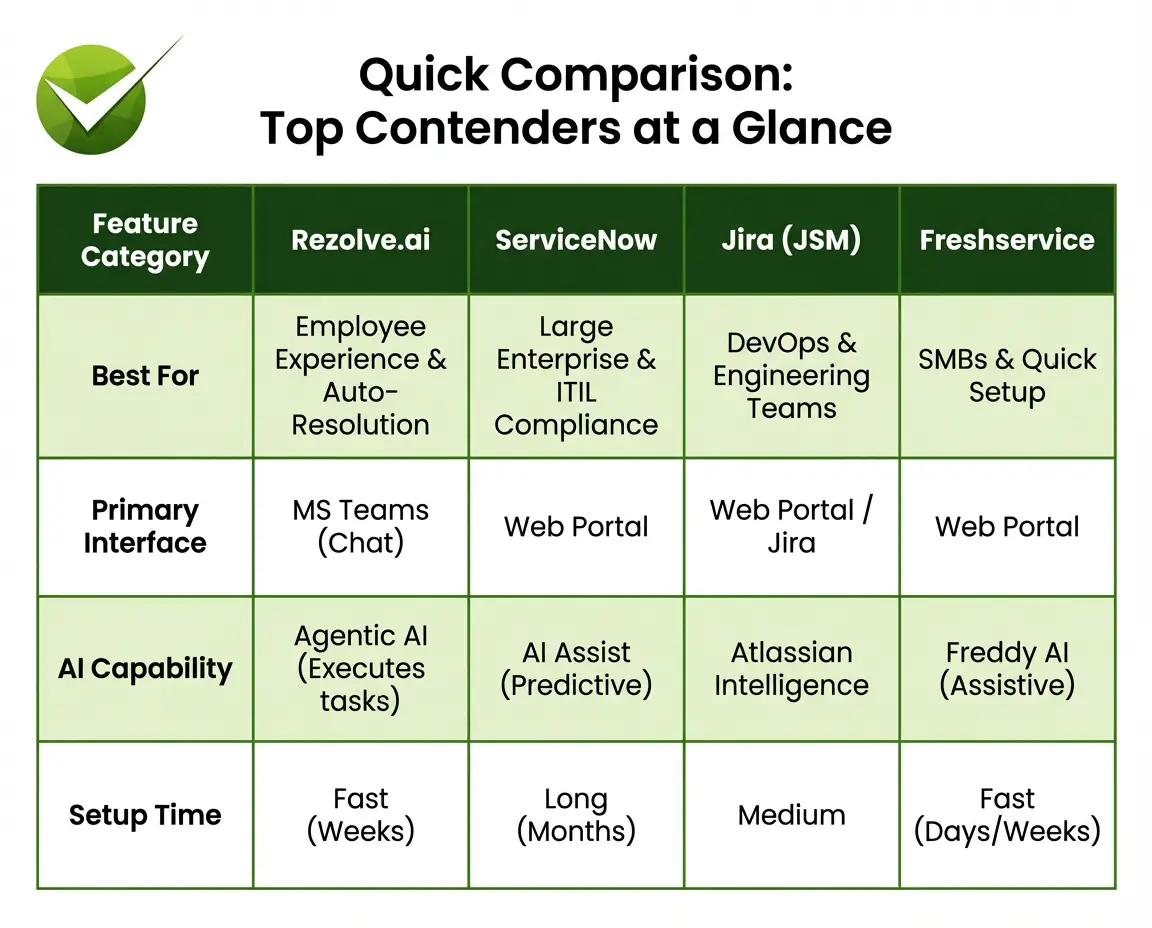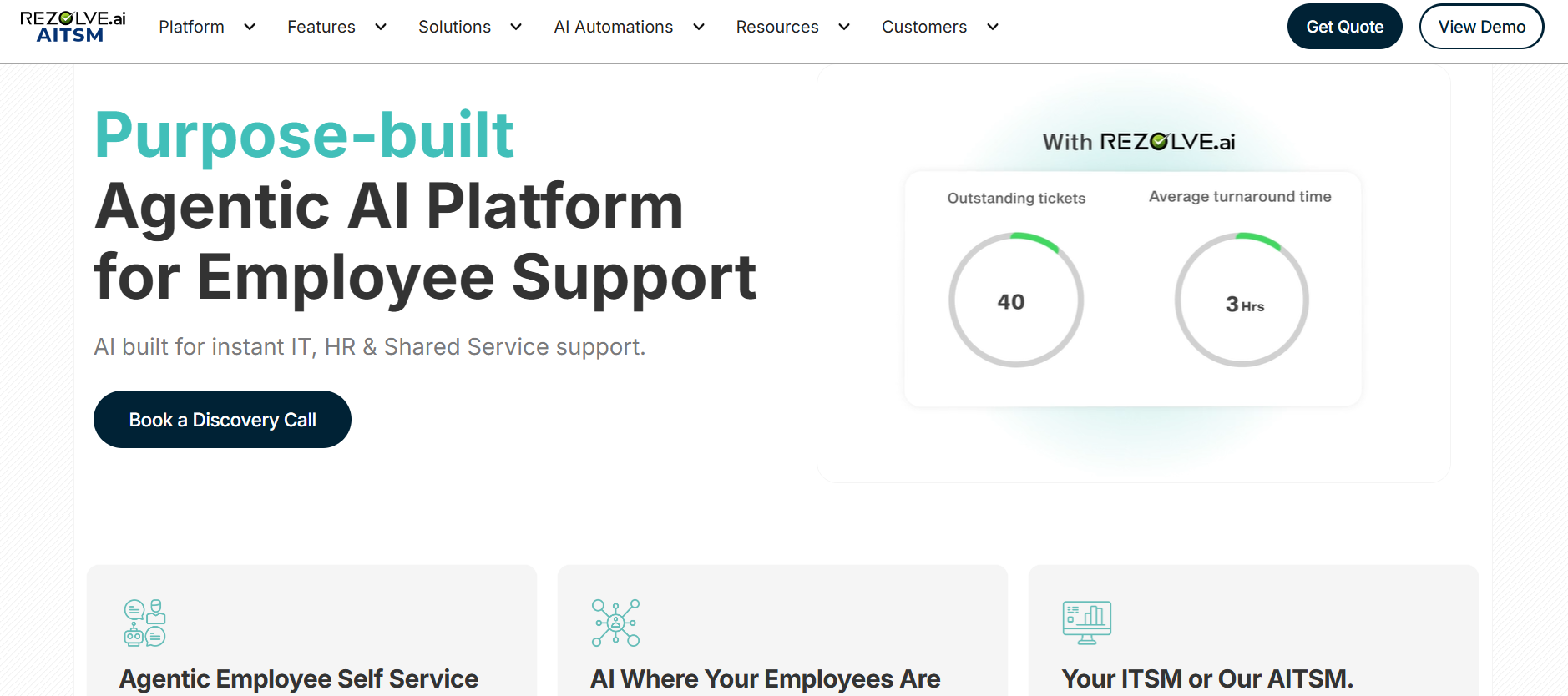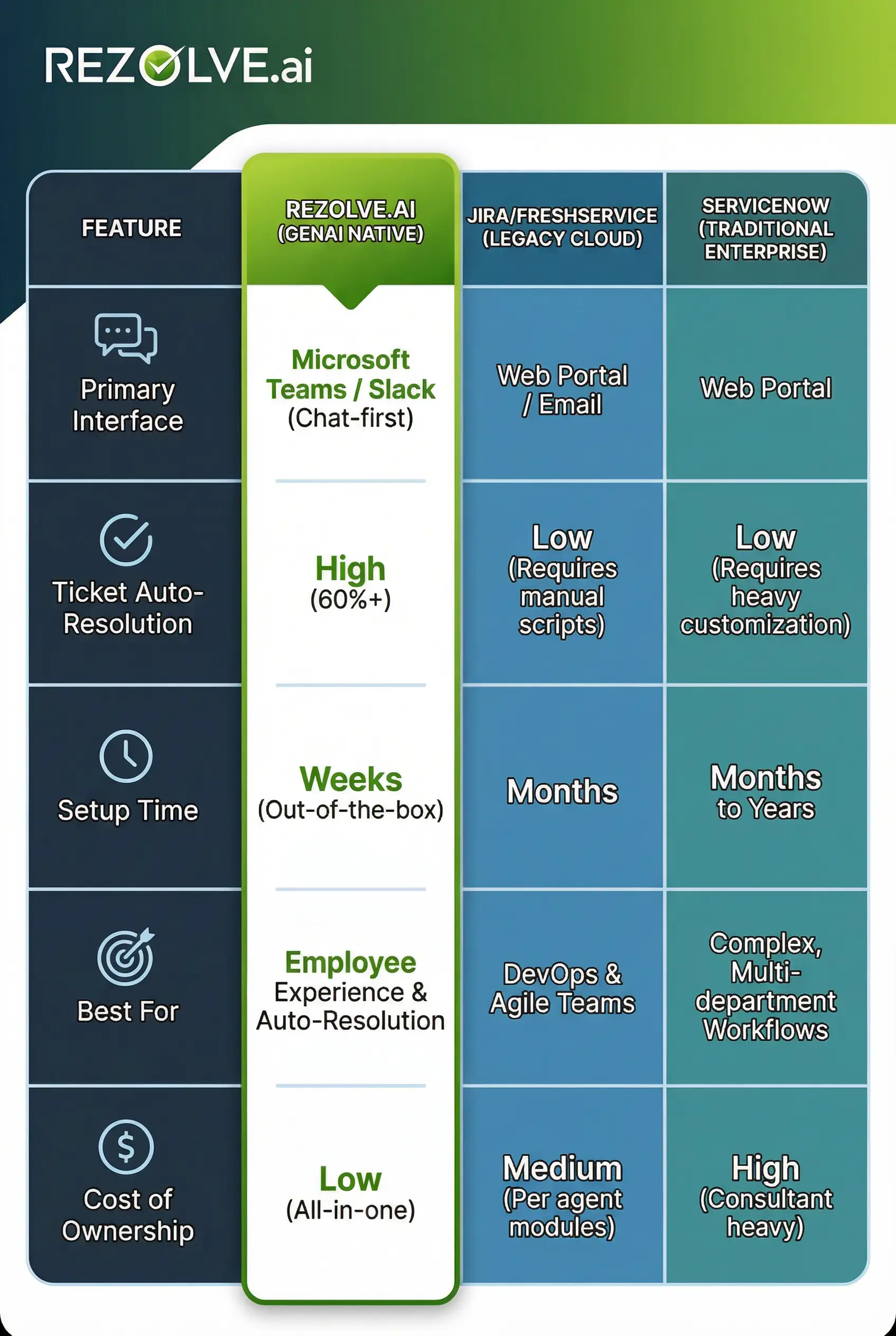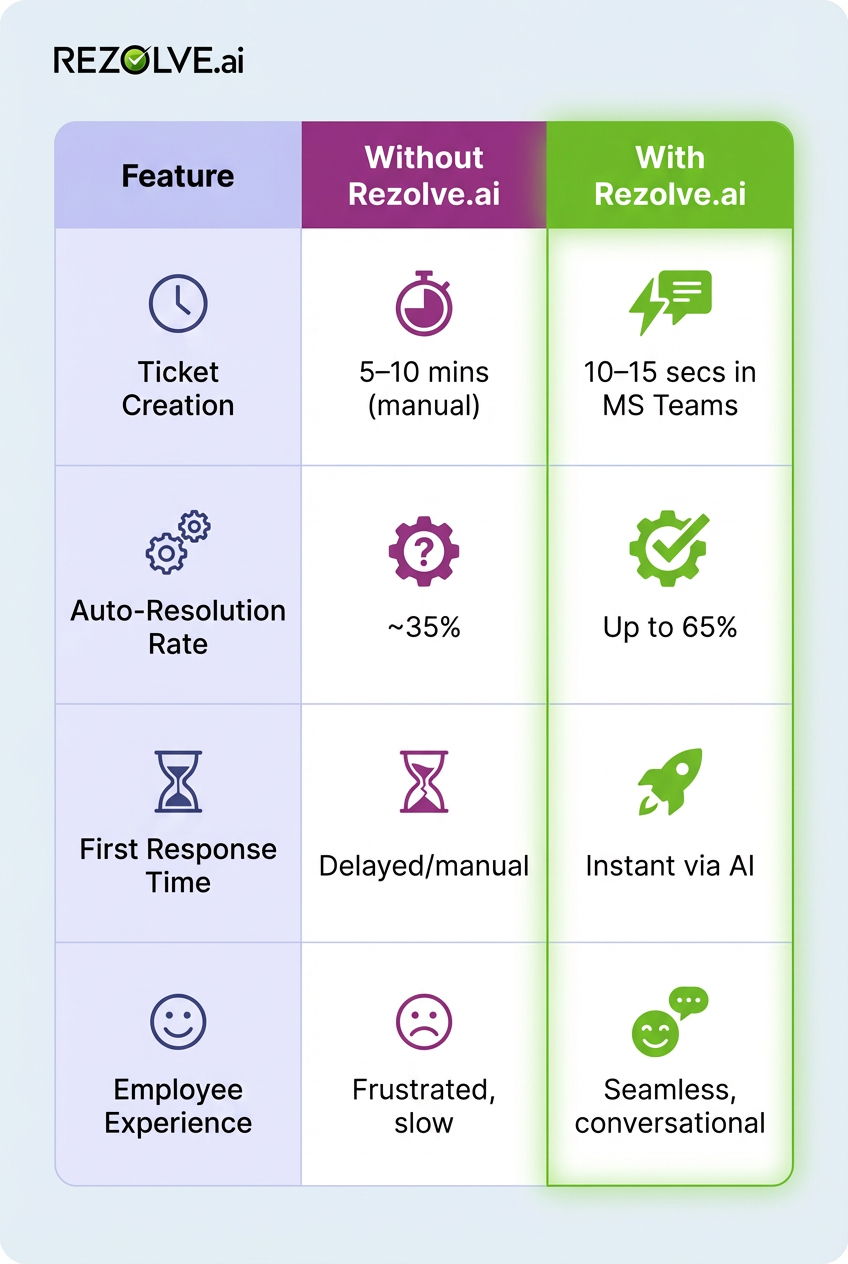TL;DR: The Quick Summary
- The Problem: Traditional ticketing systems (Jira, ServiceNow) are often siloed, slow, and force employees to use clunky portals.
- The Shift: 2025 is the year of Agentic AI. The best systems now live inside Microsoft Teams/Slack and auto-resolve 60%+ of tickets without human agents.
- Top Contenders: Rezolve.ai (Best for AI/Teams), Jira (Best for Devs), ServiceNow (Best for Enterprise complex workflows).
- The Goal: Choose a tool that reduces "Mean Time to Resolution" (MTTR), not just one that logs problems.
Quick Definition: An IT Ticketing System is a centralized platform that manages, prioritizes, and tracks IT support requests. Modern versions use GenAI to auto-resolve issues instantly, moving beyond simple "ticket logging" to actual "problem solving."
Introduction
Efficient IT support is essential for any organization. IT ticketing systems centralize issue reporting, automate routine tasks, and accelerate resolutions. A recent HDI study revealed that 87% of businesses saw improved support efficiency after implementing ticketing systems. With dozens of IT ticketing platforms on the market, choosing the right one can get overwhelming fast. Whether you're comparing features, exploring the top tools for 2026, or simply trying to understand how IT ticketing systems actually work, this guide has you covered. I evaluated 20 of the most popular customer service and IT ticketing solutions—and narrowed them down to my top 10 picks to help you find the best fit for your organization.
10 Best Ticketing Software Shortlist
1. Rezolve.ai- The Agentic AITSM for Teams-Native Enterprises.
2. Freshservice- The Fast, Friendly ITSM for SMBs.
3. ManageEngine ServiceDesk Plus- Affordable ITSM With Familiar Essentials.
4. ServiceNow- The Enterprise ITSM Powerhouse.
5. JSM- Where DevOps Meets ITSM.
6. Zendesk- Customer Support First, ITSM Second.
7. SolarWinds Service Desk- Solid ticketing and asset tracking at affordable price.
8. TOPdesk- User-Friendly ITSM With Strong Asset Support.
9. Remedyforce- Salesforce-Native ITSM for CRM-Heavy Organizations.
10. Zohodesk- Smart, Affordable Help Desk for Lean Teams.
What is an IT Ticketing System? How it works?
An IT ticketing system is a centralized tool that lets employees report issues, receive automated updates, and track resolution—eliminating siloed emails or forgotten help requests. These platforms classify tickets, assign priorities, and build a searchable knowledge base. In short, they streamline support workflows and boost transparency across the organization.
Before diving into the list of top IT ticketing systems, watch this quick video to see how modern AI-powered ticketing is revolutionizing IT support. From automated ticket resolution to seamless employee self-service, discover how AI-driven ITSM can cut down response times, reduce IT workload, and enhance the employee experience.
🎥 Watch -
The High Cost of "Old School" Ticketing: 3 Challenges IT Teams Face
Before looking at the tools, it is vital to understand why companies are switching. Most legacy platforms suffer from three crippling issues:
- The "Portal Fatigue" Problem: Employees hate logging into separate web portals. They want support where they work (Teams/Slack), leading to low adoption of self-service tools.
- Agent Burnout: Level 1 support agents spend 40% of their time resetting passwords and answering FAQs—tasks that should be automated.
- Slow Resolution Times: Tickets sit in queues, bouncing between departments, killing employee productivity.
Mini Case Study
Investors Community Bank Boosts Efficiency with Rezolve.ai's Conversational Ticketing System
Investors Community Bank of Manitowoc achieved a substantial reduction in IT ticket volumes—cutting them by approximately 50% quarter-on-quarter after implementing Rezolve.ai’s conversational ticketing system. Within just three months, the bank successfully auto-resolved nearly 34% of incoming tickets, significantly streamlining service delivery and improving operational efficiency.
How to Choose the Right IT Ticketing System: A Comparison Framework
With over 20 tools listed below, picking the "best" one depends entirely on your organization's size, tech stack, and goals. One size does not fit all. To help you navigate the list, use this framework to identify which category of buyer you fall into.
1. The 4 Main Buyer Profiles
Before analyzing the features, identify your profile:
- The Microsoft-First Enterprise: If your organization lives in MS Teams, you need a Teams-Native solution. Legacy portals will result in low adoption.
- Top Choice: Rezolve.ai (Best for Agentic AI & Teams integration).
- The Agile/DevOps Team: If your primary users are software developers who need to link support tickets to code repositories.
- Top Choice: Jira Service Management (Best for dev-heavy workflows).
- The Legacy Giant: If you have complex, rigid workflows, a massive budget, and require on-premise infrastructure or heavy ITIL customization.
- Top Choice: ServiceNow (Best for traditional enterprise complexity).
- The Lean SMB: If you need to get a helpdesk running in 24 hours with minimal configuration and low cost.
- Top Choice: Freshservice or Zoho Desk (Best for quick deployment).
2. The "Must-Have" Feature Checklist for 2026
When comparing the tools below, do not just look for "ticket logging." 2026 is the year of Agentic AI. Use this checklist to filter the list:
- Agentic AI Resolution vs. Standard Auto-Response: Does the tool actually fix the problem (e.g., reset the password, install the software) using AI, or does it just send a "Help Article" link?
- MTTR (Mean Time to Resolution): Does the vendor prove they can lower resolution time, or just track it?
- Platform Native: Does the software require a separate login/portal (high friction), or does it work where your employees already are (Teams/Slack)?

Top 21 IT Ticketing Systems for 2026
With our carefully curated list of the top 21 ticketing systems, you'll be able to find seamless IT support in no time. From industry giants to innovative newcomers, we've handpicked the best IT ticketing solutions that will undoubtedly cater to your unique needs and empower your organization's journey towards streamlined ticket resolution.
Let's check out them one by one:
1. Rezolve.ai

Best For: Mid-to-Large Enterprises using Microsoft Teams who want to automate Level 1 Support.
Rezolve.ai isn't just a ticketing system; it is an Agentic AITSM platform purpose-built for Microsoft Teams. Unlike traditional tools that just "log" tickets, Rezolve.ai uses GenAI to resolve them instantly. It acts as a "sidekick" for your employees, understanding context and executing workflows (like software installation or user onboarding) without human intervention.
Key Differentiators:
- MS Teams-Native: No external portals. Support happens 100% inside Teams chat.
- Agentic Sidekick: A GenAI bot that can troubleshoot, triage, and resolve complex issues, not just answer FAQs.
- Invisible Ticketing: Employees chat with the bot; the bot creates the ticket in the background invisibly.
Experience Agentic Sidekick 3.0 in action — no waiting, no signup. Try the interactive demo and see smart ticketing unfold instantly here!
Key Features
- GenAI-enabled Knowledge Management
- Sleek MS Teams Interface
- No-code Automation Studio
- GenAI ITSM
- GenAI Sidekick Chatbot
- Human-in-the-loop Live Chat
- Conversational Incident Management
- Conversational Ticketing System
- Conversational Service Requests and Catalog
- Automated SLA and Tracking Report
- Multi-Channel Support
- MS Teams Accessible Change Management
- Unique Desktop Automation
.avif)
Pros
- Streamlines HR processes for increased efficiency.
- Uses GenAI to categorize tickets accurately.
- Employs NLP for enhanced communication understanding.
- Provides an intuitive and user-friendly platform.
- Offers analytics for data-driven HR decisions.
- Easily scales and adapts to organizational needs.
Cons
- Relies on internet connectivity for seamless operation.
Pricing
- Contact sales for pricing plans
The Rezolve.ai Verdict: If your goal is to deflect tickets rather than just manage them, Rezolve.ai is the superior choice over legacy tools.
Book a 15-minute Demo to see Agentic AI in action.
Agentic AI Vs. Legacy IT Ticketing

2. FreshService

Best For: SMBs and mid-market companies needing a quick-start service desk.
- Overview: A cloud-based tool known for its user-friendly interface and "gamification" of the service desk. It’s excellent for IT asset management but relies on a traditional portal-based experience.
- Pros: fast setup, good asset management, affordable tiers.
- Cons: Automation is rule-based (not true AI), weak integration with MS Teams compared to native apps.
- Verdict: Good for getting started, but lacks the deep automation of GenAI platforms.
With so many ticketing systems to choose from, finding the right one can be overwhelming. Use our ITSM Product Comparison Tool to compare the top IT ticketing systems based on key features, pricing, and customer ratings.
3. ManageEngine ServiceDesk Plus

A popular ITSM system, ServiceDesk Plus by ManageEngine, provides functionality for ticketing, incident management, problem management, change management, and asset management. It offers user-friendly interface, customized processes, SLA management, and knowledge base integration. Both on-premises and cloud-based deployment options are provided by ServiceDesk Plus.
Key Features
- Automation Rules
- Self-Service Portal
- SLA Management
- Asset Management
- Mobile Access
Pros
- User-friendly interface.
- Affordable pricing options.
- Robust ticket tracking features.
Cons
- Limited automation capabilities.
- Customization can be complex.
- Reporting tools may lack depth.
Pricing
Contact Sales
Ratings & Reviews
- Gartner : 4.3/5
- Capterra : 4.4/5
4. ServiceNow

Leading ITSM platform ServiceNow provides a full range of IT service management solutions, including a powerful ticketing system. It offers a consolidated platform for handling requests, issues, and incidents related to IT. Advanced capabilities from ServiceNow include automatic ticket routing, SLA management, self-service portals, and IT system connections.
Key Features
- ITIL Compliance
- Workflow Automation
- Performance Analytics
- Knowledge Base
- Integration Capabilities
Pros
- Powerful ITSM capabilities.
- Extensive automation possibilities.
- Scalability for large enterprises.
Cons
- High implementation and maintenance costs.
- Steeper learning curve.
- Customization may require expertise.
Pricing
Contact Sales
Ratings & Reviews
- G2.com : 4.3/5
- Capterra : 4.5/5
Before you Decide- Compare Rezolve.ai Vs Servicenow
5. Jira Service Management

Best For: DevOps teams and software companies.
- Overview: If your developers live in Jira, JSM is the logical extension. It bridges the gap between IT operations and code development.
- Pros: Incredible integration with development workflows, agile-ready.
- Cons: Can be overwhelming for non-technical HR/Finance teams; UI is complex.
6. Zendesk

Popular cloud-based customer service platform Zendesk has an IT support ticketing system. It has an intuitive user interface, support for many communication channels (email, chat, social media), automation features, and reporting tools. For customer cooperation, Zendesk provides community forums, knowledge base integration, and customization possibilities.
Key Features
- Multi-Channel Support
- Ticket Tagging
- Knowledge Base
- Satisfaction Surveys
- AI-Powered Automation
Pros
- Intuitive and user-friendly.
- Seamless multichannel support.
- Robust reporting capabilities.
Cons
- Higher pricing for advanced features.
- Limited native ITSM features.
- Dependency on third-party integrations.
Pricing
- Support Team US$ 19 per agent/month (US$ 1.140/year for 5 agents)
- Support Professional US$ 55 per agent/month (US$ 3.300/year for 5 agents)
- Support Enterprise US$ 115 per agent/month (US$ 6.900/year for 5 agents)
Ratings & Reviews
- G2.com : 4.3/5
- Capterra : 4.3/5
7. Sysaid

An ITSM ticketing solution called SysAid provides ticketing, asset management, and self-service features. It offers functions including reporting, remote help, automation, and knowledge base integration. SysAid is renowned for its intuitive user interface, simplicity of usage, and customizable dashboards.
Key Features
- IT Asset Discovery
- Problem Management
- Change Control
- Self-Service Portal
- Knowledge Base
Pros
- Easy setup and configuration.
- Affordable pricing options.
- ITIL-based best practices.
Cons
- Interface can be outdated.
- Limited advanced reporting.
- Customization may be restrictive.
Pricing
Contact Sales
Ratings & Reviews
- G2.com : 4.5/5
- Capterra : 4.6/5
8. BMC Helix ITSM

An effective IT ticketing system is part of the enterprise-grade IT service management platform BMC Helix ITSM. It has capabilities like configuration management, problem solving, change management, and incident management. Advanced customization possibilities, strong automation abilities, and connections with IT operations tools are all offered by BMC Helix ITSM.
Key Features
- Intelligent Automation
- Multi-Cloud Management
- Service Request Catalog
- Smart Reporting
- CMDB Integration
Pros
- Comprehensive ITSM suite
- Powerful automation capabilities
- Scalable for large organizations
Cons
- High initial and ongoing costs
- Complex implementation process
- Resource-intensive for small teams
Pricing
Contact Sales
Ratings & Reviews
- G2.com : 3.7/5
- Capterra : 4.1/5
9. SolarWinds Service Desk

A cloud-based ITSM platform called SolarWinds Service Desk has ticketing, incident management, and knowledge management functions. It provides reporting tools, automation choices, and IT system connectors. For end customers, SolarWinds Service Desk offers a user-friendly interface, mobile apps, and self-service options.
Key Features
- Incident Tracking
- Request Fulfillment
- Change Management
- Asset Discovery
- Service Level Agreements
Pros
- User-friendly interface.
- Affordable pricing options.
- ITIL-aligned service management.
Cons
- Limited native integrations.
- Advanced features may require add-ons.
- Reporting capabilities can be basic.
Pricing
- Essentials $39 per month
- Advanced $79 per month
- Premier $99 per month
Ratings & Reviews
G2.com : 4.3/5
Capterra : 4.6/5
10. Samanage (Now part of Solarwinds)
A ticketing system, asset management, and a self-service portal are all features of the IT service management program Samanage. It has a user-friendly UI, automation tools, and integration possibilities. Samanage offers reporting, knowledge base, incident management, and change management capabilities.
Key Features
- Service Catalog
- Contract Management
- Incident Resolution
- Knowledge Base
- Service Portal
Pros
- Intuitive and user-friendly.
- Robust self-service portal.
- Strong asset management capabilities.
Cons
- Higher pricing for additional features.
- Customization options may be limited.
- Learning curve for complex workflows.
Pricing
Reach out to sales team
Ratings & Reviews
Not available
AI-Powered Ticketing Tool: Before vs. After Rezolve.ai
Here’s a quick snapshot of how employee support dramatically changes once organizations switch to Rezolve.ai. Instead of relying on slow, ticket-heavy processes, Rezolve.ai replaces friction with conversational AI, instant resolutions, automated workflows, and real-time support inside Microsoft Teams. The table below highlights the clear shift in efficiency, speed, and experience — before vs. after Rezolve.ai.

11. Axios Systems Assyst (Now IFS Assyst)

Ticketing, incident, problem, change, and configuration management are all features of the enterprise-level ITSM platform Axios Systems Assyst. It includes a self-service portal, broad customization possibilities, interfaces with other IT products, comprehensive reporting, and analytics.
Key Features
- ITIL Framework
- Real-Time Reporting
- Knowledge Management
- Service Catalog
- Self-Service
Pros
- Comprehensive ITSM suite.
- ITIL-aligned processes.
- Powerful reporting and analytics.
Cons
- Higher upfront costs.
- Customization can be complex.
- Limited third-party integrations.
Pricing
Contact Sales
Ratings & Reviews
- Gartner : 4.4/5
- G2.com : 3.5/5
12. Cherwell Service Management
An ITSM platform called Cherwell Service Management offers ticketing, incident management, problem management, change management, and other ITIL-compliant procedures. It allows for customizable flexibility, enabling businesses to adapt the ticketing system to their particular requirements. Additionally, Cherwell Service Management provides capabilities like self-service portals, automated workflows, and connections with external software.
Key Features
- Business Process Automation
- Configuration Management
- Knowledge Base
- Mobile Access
- Dashboards and Analytics
Pros
- Flexible and configurable.
- Codeless customization options.
- Comprehensive ITSM capabilities.
Cons
- Steeper learning curve.
- Higher initial setup costs.
- Limited out-of-the-box automation.
Pricing
Contact Sales
Ratings & Reviews
- G2.com : 4/5
- Capterra : 4.4/5
13. Freshworks ITSM

A cloud-based platform for IT service management called Freshworks ITSM offers functionality for ticketing, incident management, problem management, change management, and asset management. It offers a user-friendly interface with drag-and-drop functionality for customizing workflow. Additionally, automation functionality, knowledge base connectivity, and real-time collaboration possibilities are provided by Freshworks ITSM.
Key Features
- Ticket Automation
- Problem Analysis
- Mobile Access
- SLA Management
- Collaboration Tools
Pros
- Intuitive interface.
- Affordable pricing.
- Seamless ITIL compliance.
Cons
- Limited advanced features.
- Customization options may be basic.
- Scalability challenges for large enterprises.
Pricing
Contact Sales
Ratings & Reviews
- G2.com : 4.6/5
- Capterra : 4.5/5
14. Desk365

Desk365 offers a robust, cloud-based ticketing system that is both user-friendly and easy to implement, designed to enhance your team’s productivity by managing service desk incidents and requests smoothly. It simplifies day-to-day operations with workflow automation, collaborative tools, and customizable forms. Additionally, Desk365 integrates directly with Microsoft Teams, making it a highly convenient solution for organizations already utilizing the Teams platform for communication and collaboration.
Key Features
- Microsoft Teams integration
- Ticket Automation
- Customizable ticket forms and fields
- SLA management
- Reporting and analytics
- Knowledge Base
- Multi-channel support, including email and Teams.
Pros
- Simple and intuitive interface.
- Quick setup, allowing for rapid deployment with minimal configuration.
- Affordable pricing, with plans starting at just $12.
- Scalable to suit both SMBs and enterprises.
- Automated workflows that help reduce manual effort and increase efficiency.
- Seamless Integration with the Microsoft 365 Ecosystem.
Cons
- Limited third-party integrations
- A free plan is limited to 3 agents and 50 tickets per month
- Retail-oriented channels like WhatsApp are yet to be added.
Pricing
All features for just $12 /agent /month.
Ratings & Reviews
- G2.com: 5/5
- Capterra: 4.9/5
15. Hornbill Service Manager

Hornbill Service Manager is an ITSM solution that offers ticketing, incident, problem, change, and configuration management features. It provides user-friendly interface, workflow automation, collaborative capabilities, and customized forms. Additionally, Hornbill Service Manager offers comprehensive reporting options and integration options with other IT systems.
Key Features
- Collaboration Spaces
- Request Fulfillment
- Self-Service Portal
- Business Process Automation
- Knowledge Base
Pros
- Collaborative service management.
- Codeless customization.
- Unified communication platform.
Cons
- Limited third-party integrations.
- Learning curve for advanced features.
- Higher initial setup costs.
Pricing
Contact Sales
Ratings & Reviews
- G2.com : 4.5/5
- Capterra : 4.7/5
16. TOPdesk

Ticketing, incident management, problem management, change management, and self-service capabilities are all included in the ITSM and service management platform TOPdesk. It offers a user-friendly interface with simple drag-and-drop capability and quick navigation. Additionally, TOPdesk offers interaction with knowledge bases, reporting tools, automation options, and customization freedom.
Key Features
- Incident Management
- Self-Service Portal
- Asset Management
- SLA Monitoring
- Reporting
Pros
- User-friendly interface.
- Strong asset management.
- Customizable without coding.
Cons
- Limited automation capabilities.
- Advanced features may require add-ons.
- Reporting tools may lack depth.
Pricing
Contact Sales
Ratings & Reviews
- G2.com : 4.1/5
- Capterra : 4.5/5
17. Ivanti

The ITSM platform Ivanti Neurons offers functionality for ticketing, incident management, problem management, change management, and asset management. It provides options including automation, knowledge base integration, self-service portals, and collaborative tools. Additionally, Ivanti Service Manager offers complete reporting and analytics capabilities as well as connections with other IT platforms.
Key Features
- Endpoint Management
- Service Automation
- Change Control
- Incident Tracking
- Self-Service Options
Pros
- Unified ITSM and ITAM.
- Robust automation features.
- Scalable for enterprise use.
Cons
- Higher initial costs.
- Complex implementation process.
- Requires skilled administrators.
Pricing
Contact Sales
Ratings & Reviews
- Gartner : 4.2/5
- G2.com : 4.2/5
18. Remedyforce
Built on the Salesforce platform, Remedyforce is a cloud-based IT service management solution. It has capabilities for asset management, incident management, problem management, and ticketing. Remedyforce offers possibilities for real-time collaboration, a self-service portal, knowledge base integration, and automation functions.
Key Features
- ITIL Service Management
- Change Management
- Knowledge Base
- Asset Management
- Multi-Channel Support
Pros
- Salesforce integration.
- ITIL-aligned processes.
- Strong automation capabilities.
Cons
- High licensing costs.
- Requires Salesforce expertise.
- Customization may be complex.
Pricing
Contact Sales
Ratings & Reviews
- G2.com : 3.9/5
- Capterra : 4.4/5
19. ManageEngine SupportCenter Plus

Web-based customer support software from ManageEngine called SupportCenter Plus has tools for ticketing, incident management, problem management, and change management. It provides self-service choices, automation options, knowledge base connection, and extensive reporting tools. Additionally, SupportCenter Plus offers ways to integrate with other ManageEngine products.
Key Features
- Ticketing System
- Knowledge Base
- Automation Rules
- SLA Management
- Mobile Access
Pros
- Affordable pricing.
- Integrated remote support.
- User-friendly interface.
Cons
- Limited advanced features.
- May lack scalability for large enterprises.
- Reporting capabilities can be basic.
Pricing
Contact Sales
Ratings & Reviews
- G2.com : 4.2/5
- Capterra : 4.4/5
20. Zoho Desk

A cloud-based platform for customer assistance called Zoho Desk offers ticketing, case management, knowledge bases, and self-service features. It offers integration features, collaboration tools, multi-channel support, and automation possibilities. Real-time reporting, customization possibilities, and tools for gauging customer satisfaction are all provided by Zoho Desk.
Key Features
- Multi-Channel Support
- AI-Powered Assistance
- Self-Service Portal
- Ticket Tagging
- Knowledge Base
Pros
- Affordable pricing.
- Seamless multichannel support.
- Strong knowledge base.
Cons
- Limited ITSM functionalities.
- Advanced features may require add-ons.
- May not suit complex workflows.
Pricing
Contact Sales
Ratings & Reviews
- G2.com : 4.4/5
- Capterra : 4.5/5
Why Upgrade? The ROI of AI Ticketing. Click here to download our Ebook
Implementation and Maintenance of an IT Ticketing System
Implementing and maintaining an IT ticketing system involves several steps to ensure successful deployment and ongoing support. Here's a breakdown of the key activities involved:
1. Define Objectives and Requirements
Start by clearly defining the objectives and requirements of the ticketing system implementation. Identify the pain points and goals you want to address with the system, such as improving ticket resolution time or enhancing customer satisfaction. Outline the specific features and functionalities you need in the system to meet those requirements.
2. Select the Right Ticketing System
Research and evaluate different ticketing systems based on your defined objectives and requirements. Consider factors such as functionality, customization options, scalability, integration capabilities, security, user-friendliness, and vendor reputation. Request demos, gather stakeholder feedback, and choose the ticketing system that best aligns with your needs.
3. Plan and Prepare for Implementation
Develop a detailed implementation plan that outlines the steps, timelines, and responsibilities for deploying the ticketing system. Identify any required infrastructure changes, data migration needs, or integration requirements with other systems. Allocate resources and establish a project team responsible for the implementation.
4. Customize and Configure the System
Customize the ticketing system to align with your organization's workflows and processes. Define ticket categories, priority levels, notification rules, and other configuration settings based on your requirements. Ensure the system reflects your terminology and branding, creating a familiar user environment.
5. Data Migration
Plan and execute a data migration strategy if you are transitioning from an existing ticketing system or manual processes. Cleanse and map the data from the old system or spreadsheets to fit the new ticketing system's structure. Verify the accuracy of the migrated data and ensure that historical tickets, user information, and relevant data are correctly transferred.
.avif)
6. Train Users and Provide Documentation
Conduct training sessions for IT staff and end-users to familiarize them with the ticketing system. Provide comprehensive documentation, user guides, and FAQs to assist users in navigating the system and understanding its features. Encourage users to ask questions and provide ongoing support during the learning phase.
7. Test and Validate
Before rolling out the ticketing system to the entire organization:
- Conduct thorough testing and validation.
- Test different scenarios, workflows, and system integrations to ensure smooth functioning.
- Identify and address any issues or bugs during this testing phase to minimize disruptions during the live implementation.
8. Launch and Communicate
.avif)
Communicate the launch of the ticketing system to the organization. Clearly explain the benefits, usage guidelines, and support channels available. Promote the system's adoption by highlighting its value, emphasizing its ease of use, and addressing any user concerns or resistance. Encourage feedback and foster a culture of continuous improvement.
9. Monitor and Maintain
Regularly monitor the ticketing system's performance, including system uptime, response times, and user feedback. Address any technical issues promptly and provide ongoing support to users. Stay updated with system updates and patches released by the vendor, ensuring that the system remains secure and up to date.
10. Continuous Improvement
Continuously assess and improve the ticketing system based on user feedback, changing business needs, and emerging technologies. Leverage reporting and analytics features to identify trends, measure key performance indicators, and make data-driven improvements. Engage with users and stakeholders to gather suggestions for enhancements and iterate on the system to optimize its value.
What Makes Rezolve.ai's Conversational Ticketing an Ideal IT Ticketing System?
CRO Insight-“The future of service desk lies in AI-powered systems that don’t just create tickets—they resolve issues instantly through conversational interfaces embedded right where employees work, like Teams or Slack. With Rezolve.ai, we’re reducing enterprise friction by automating the simple, so your people and service desk teams can focus on what truly matters.”
— Manish Sharma, Chief Revenue Officer, Rezolve.ai
Key Takeaways / TL;DR
- Agentic AI-driven ticketing systems like Rezolve.ai significantly improve IT support efficiency.
- Real-world deployments show measurable benefits: faster ticket creation, higher satisfaction, and reduced IT workloads.
- Seamless integration with Microsoft Teams boosts adoption.
Conclusion
Today's ever-evolving environment makes IT ticketing systems an absolute necessity rather than a luxury. Organizations can streamline their workflows, improve response times, and enhance collaboration between IT teams and end-users by implementing the right IT ticketing system. As the corporate world strives for efficiency, productivity, and seamless operations, the role of an IT ticketing system becomes increasingly critical.
With its ability to address ticket resolutions, ensure personalized support, and provide invaluable insights- an IT ticketing system emerges as the cornerstone of adequate IT support.
FAQs
1. Why is an IT ticketing system critical for organizations?
An IT ticketing system is critical for organizations because it brings numerous benefits. It allows effective ticket management and tracking, enhances response and resolution times, improves communication between the IT support team and employees, promotes self-service capabilities, provides valuable analytics for process improvements, and ensures a structured and documented approach to IT support.
2. How does an IT ticketing system improve efficiency?
An IT ticketing system improves efficiency by centralizing the management of IT tickets, allowing for better prioritization and assignment of tasks. It eases manual effort, enhances IT team collaboration, streamlines employee communication through automated notifications and updates, and provides a knowledge base for self-service options. These features collectively enhance productivity, reduce downtime, and optimize resource allocation.
3. What are the three types of tickets in an IT ticketing system?
There are three main categories of tickets found in an IT ticketing system:
Ticket incidents : These are utilized to report and address particular issues or issues, such as network outages, hardware breakdowns, and software malfunctions.
Tickets for Service Requests :These tickets are for planned, non-urgent tasks like requesting access permissions, installing software or upgrading hardware.
Tickets for Change Requests :They ensure that changes are planned, tested, and implemented with the least disruption and risk possible; change request tickets are created to document and manage IT infrastructure or service changes.
4. How can an IT ticketing system benefit IT support teams?
An IT ticketing system benefits IT support teams by providing a structured approach to issue management, ensuring no tickets are overlooked or forgotten. It allows for efficient task assignment and workload distribution among team members. The system also captures valuable data and analytics, enabling IT teams to identify recurring issues, assess performance metrics, and make data-driven improvements to their processes and workflows.
5. What should organizations consider when choosing an IT ticketing system?
While choosing an IT ticketing system, organizations should consider factors such as :
- Ease of use
- Scalability
- Integration capabilities with existing systems
- Reporting and analytics features
- Mobile accessibility
- Security measures
- Customization options

.png)




.webp)




.jpg)

.png)








.png)